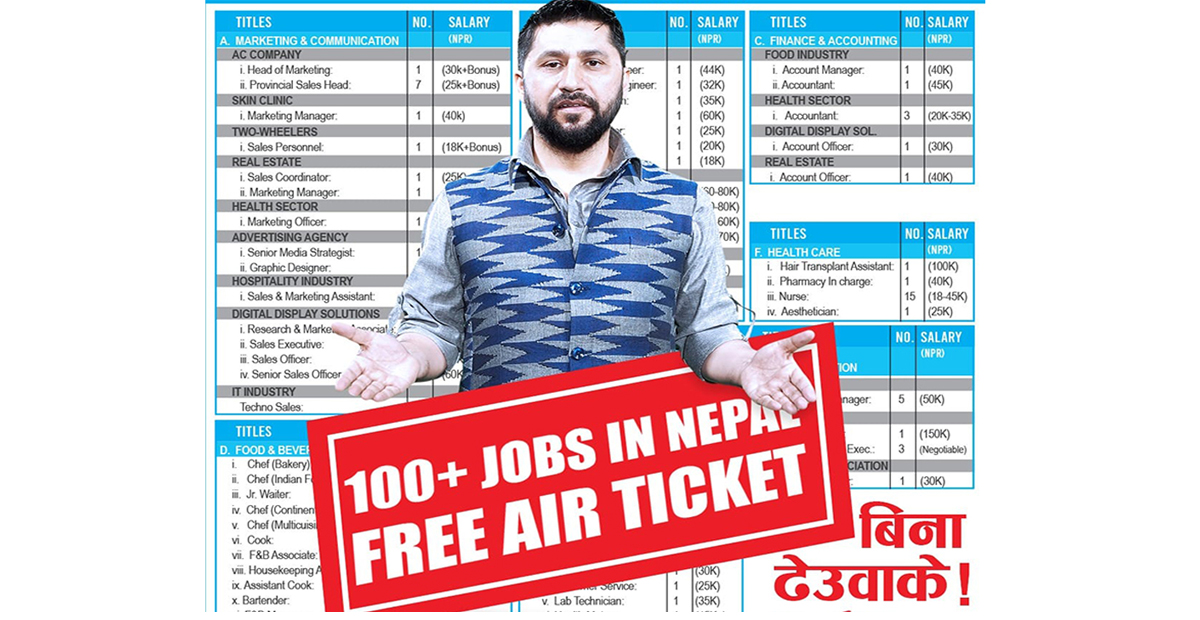Rastriya Swatantra Party (RSP) President Rabi Lamichhane posted an advertisement on social media Tuesday night inviting applications for different jobs from Nepalis working abroad.
The advertisement seems to follow on his promise during the recent by-election in Chitwan-2 that he would bring back at least 100 persons working abroad with jobs in Nepal within 100 days of his electoral victory.
Lamichhane has revealed that the vacancy announcements have been published in the local media of Japan, South Korea, Australia and Saudi Arabia.
Applications have been sought in six different categories with minimum monthly salary— for example, Rs 45,000 for an electrical engineer and Rs 18,000 for a nurse.
Nepali workers earn many times more than the salary that Lamichhane has offered. RSP seems to be merely posting vacancy announcements like job portals do. The difference being those applying for the jobs offered by RSP will have to mail to the party and not the employers as in the case of job portals.
Setopati texted questions to Lamichhane Wednesday morning regarding his announcement. There were four questions.
Who will provide these jobs? Is it RSP or different stores, offices and hospitals? Why has RSP invited applications if others will provide the jobs? Who will conduct interviews for the job applicants and select the successful candidates? Can youths in Nepal apply for these jobs or not? Is RSP a place to help people find jobs?
If the jobs are for those abroad, Nepalis working in which country would return to get jobs that pay Rs 30,000 for marketing chief, Rs 25,000 for sales head and Rs 18,000 for nurse? From Australia, United Kingdom, Japan or UAE?
Are you teasing or insulting Nepalis who are earning hundreds of thousands in those countries or you don’t understand? You yourself earned hundreds of thousands a month while you were in America.
Who will pay for the air ticket for those who want to return from Japan or Australia? You or the party? What is the source for that?
Lamichhane responded that he was busy and offered to talk in the evening.
Setopati talked with a few RSP leaders about the issue. A lawmaker said that the plan was not discussed in the party. “I heard that he posted on social media last night. I have not looked at that as I’m not interested much,” the lawmaker added.
Another lawmaker said that Lamichhane had shown a photo of advertisement in the House a few days back saying he was going to invite job applications from those returning from abroad. “That is his personal issue rather than the party’s. We had talked that we could connect those returning from abroad to the employers,” the lawmaker added. “But he also mentioned ‘bina dheuba ke’ (without money or for free) while posting on social media. That looks very cheap. That should not have been written.”
The ‘bina dheuba ke’ is a dig at CPN (Unified Socialist) Chairman Madhav Kumar Nepal who had used the term during the election campaign before the general election in November 2022 to point that the ruling coalition had made arrangements for free visa and free air ticket to those going abroad for employment.
RSP Spokesperson Mukul Dhakal said that Lamichhane’s secretariat prepared the advertisement and referred Setopati to central member in Lamichhane’s secretariat Pratibha Rawal. Setopati asked her questions similar to those asked to Lamichhane.
She said that the job applications had been sought in coordination with employers in Nepal to send a message that the gate for opportunities inside the country had been opened and Nepalis need not go abroad for difficult jobs to earn a pittance.
She claimed that the party would provide expensive air tickets for free if Nepali workers working abroad wanted to return home for those jobs offered by the party. “We are also talking with airlines and employers. We will bear expenses for the tickets if they don’t agree to contribute.”
When asked why the party believes that nurses working abroad would return for a monthly salary of Rs 18,000, she pointed that the party had sought applications on the basis of details provided by employers. “The jobs and salaries would be in accordance with the conditions set by the employers. We will just facilitate,” she stated. “We are also thinking if our party can also create some jobs. We have taken this as works that can be done immediately while thinking about ways to bring back Nepalis working abroad.”
Political scientist Krishna Khanal said that political parties should focus on formulating policies for job creation instead of distributing jobs but added that trying to work in accordance with the election-time promise should not be taken otherwise.

